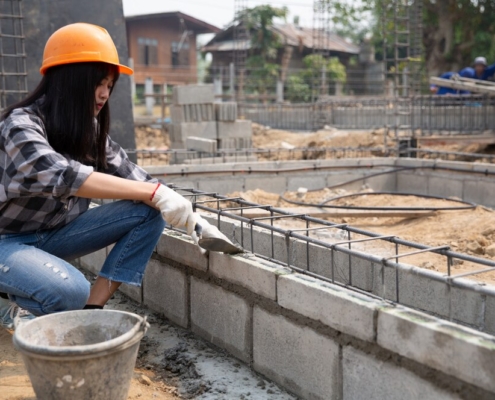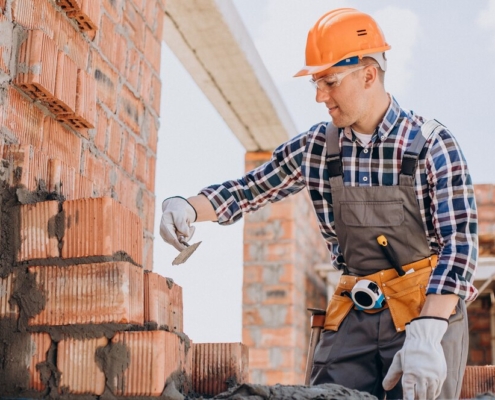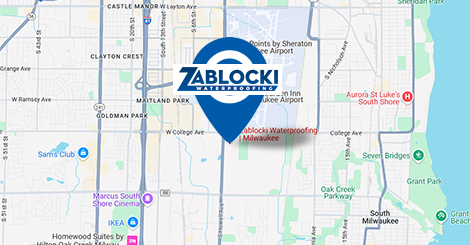 If you’re a homeowner in Milwaukee, then you know that the weather here can be pretty unpredictable. One day it can be sunny and warm, and the next it could be cold and rainy. With such weather patterns, it’s important to make sure your home is properly protected against any potential water damage.
If you’re a homeowner in Milwaukee, then you know that the weather here can be pretty unpredictable. One day it can be sunny and warm, and the next it could be cold and rainy. With such weather patterns, it’s important to make sure your home is properly protected against any potential water damage.
In fact, according to statistics from The Insurance Information Institute (III), basement flooding is one of the most common homeowners insurance claims in the United States. However, many homes have systems already in place to protect against dangerous basement moisture and flooding. One you may have noticed in your home is a system of holes in your brick or concrete block foundation walls. These are called “weep holes.”
In this blog post, we’ll discuss all you need to know about foundation weep holes – what they are, why they’re important, and how to maintain them.
Jump to article sections:
- What are Foundation Weep Holes?
- Where are Weep Holes Found?
- How Do Foundation Weep Holes Work?
- Are Foundation Weep Holes Right for Your Home?
- Should You Buy a Home with Foundation Weep Holes?
- Additional Milwaukee Waterproofing Methods
1. What are Foundation Weep Holes?
Foundation weep holes are small openings in the foundation walls of a building that allow water to escape. They are typically installed during construction and are located at the base of the foundation, near the ground level. These holes provide an outlet for any excess water that may collect behind the foundation walls due to rain or flooding.
But don’t let their small size fool you – these tiny holes play a crucial role in keeping your basement dry and preventing serious water damage to your home’s foundation. So, it’s important to understand their purpose and how they work.
2. Where are Weep Holes Found?
Weep holes are most commonly seen in homes with brick or concrete block foundations. Types of homes that tend to have weep holes are those built on sloped land. This is because water is more likely to enter the foundation walls on a sloped lot than it is on a level one.
Weep holes are also a common supplemental strategy in homes with basement waterproofing systems, such as French drains or sump pumps. This is because these systems can’t always prevent all water from entering the foundation, so weep holes provide a way for any water that does get in to drain out.
3. How Do Foundation Weep Holes Work?
As mentioned earlier, weep holes allow water to escape from behind your foundation walls. This is important because if too much water accumulates, it can create pressure and cause the walls to crack or even collapse.
Foundation weep holes also help with ventilation by allowing air to circulate behind the walls, which helps prevent mold growth and other moisture-related problems.
But how does the water actually escape through these small holes? Well, it’s all thanks to gravity and a drainage system. The weep holes are strategically placed above a layer of gravel or crushed stone that acts as a drainage system. When water collects behind the foundation wall, it will naturally drain down towards this layer and then out through the weep holes.
4. Are Foundation Weep Holes Right for Your Home?
If you have an older home, chances are you already have weep holes installed. However, if you’re having issues with water in your basement, it’s important to check that they are clear and functioning properly.
For newer homes or those without weep holes, it may be worth considering installing them as a preventative measure against potential water damage. However, it’s always best to consult with a professional waterproofing company who can assess the specific needs of your home and make recommendations accordingly.
5. Should You Buy a Home with Foundation Weep Holes?
 While foundation weep holes can be a sign of a well-built home, they’re not right for everyone. In the Milwaukee area with our large amount of snowmelt and rainfall, weep holes alone may not be enough to protect your home from water damage. In these cases, it’s best to choose a different type of basement waterproofing system.
While foundation weep holes can be a sign of a well-built home, they’re not right for everyone. In the Milwaukee area with our large amount of snowmelt and rainfall, weep holes alone may not be enough to protect your home from water damage. In these cases, it’s best to choose a different type of basement waterproofing system.
There are a few different types of basement waterproofing systems to choose from, and the right one for your home depends on a number of factors. These include the type of foundation you have, and how susceptible your basement is to water damage. Some common types of basement waterproofing systems are French drains, sump pumps, and exterior waterproofing membranes.
To determine which basement waterproofing system is right for your home, it’s best to consult with a professional. They can assess your basement and foundation to determine which system will work best for your needs.
6. Additional Milwaukee Waterproofing Methods
In addition to foundation weep holes, there are a variety of other methods for waterproofing your basement that can be offered by professionals in the Milwaukee area. Some of these include interior and exterior drainage systems, crack repair, and mold remediation.
It’s important to note that while some homeowners may attempt to fix water damage themselves, it’s always best to consult with a professional. Water damage can have serious consequences on your home’s structure and cause health hazards if not properly addressed.
At Zablocki Waterproofing, we’re experts in Milwaukee basement waterproofing, foundation repair, and more. We’ve been helping homeowners in Milwaukee protect their homes from water damage for decades. If you’re in need of basement waterproofing or foundation repair, we’re here to help. Contact us today to learn more about our services or to schedule a free consultation.
 By Dale Granbois, co-owner of Zablocki Waterproofing
By Dale Granbois, co-owner of Zablocki Waterproofing
Dale Granbois is the proud co-owner of Zablocki Waterproofing, the premier basement waterproofing and foundation repair service provider in Milwaukee. Our team of experienced professionals offer a variety of services from complete basement waterproofing solutions to structural foundation repairs -all designed to keep your home or business safe and dry. Let us save you from expensive headaches caused by water damage and give you peace of mind with a safe and secure property. Contact us today for more information!





